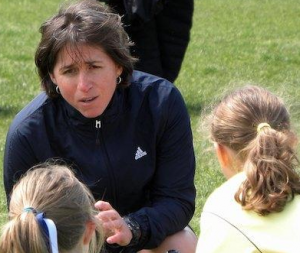Youth Soccer Player Development At Recreational Soccer: Parents Role From Pitch Side
What should parents do? Supportive, encouraging behavior is always important; so is remembering that you, as parents, are the ultimate role model.
Make sure you always do your best to get along with and appreciate your volunteer youth soccer coach.

Each weekend we can see the sideline filled with colorful chairs and cheering parents. Parents come early to get a good spot on the sideline so they can see the action from all angles. Once the whistle blows and the first ball is played, we as coaches hope we only hear the positive cheers and team chants that serve to motivate each player on the team. For the most part, I would say parents are great sideline fans and do support all of the athletes regardless of skill. However, coaches still have to deal with a few parents who still do not truly embrace the spirit of youth sport.
As we enter the middle of the spring soccer season it is important to remind parents that volunteer coaches are spending so much time organizing practices, figuring out game day rotations so each child had a chance to start the game, and dealing with sending reminder updates to parents, along with other behind the scene tasks. Speaking for myself as I volunteer coach, I enjoy all of the soccer related and management responsibilities in this role. What does weigh on my mind however are some of the negative comments I hear as I walk the sidelines of many soccer games each week.
In order to spread positive soccer vibes on soccer field across the nation, I created a list of pitch side Do’s and Do Not’s:
Do’s:
Do make it a point to cheer for the effort each player is generating on the field. It does not matter if our young soccer players cannot execute plays or techniques, what does matter is that the athlete tried. The score should not be the most important aspect of the game. Improvements in individual and team play must be celebrated.
Do reinforce to your child that the coach is like a teacher. Each player must display the highest level of respect and must listen to the coach at all times.
Do watch your child as they interact with their coach. If the child is not listening or is talking when the coach is trying to instruct, be sure to explain to your soccer player the importance of paying attention.
Do watch your player’s contact with teammates. Pay attention to the words they are using to communicate to their teammates. Spend time observing how they interact with their team on the field and on the bench. If your soccer player can be a better teammate, give them some ideas on how to have positive sport talk on and off the field.
Do Not’s
Do not coach from the sideline. At this point in the season it is probably too late to volunteer to coach. Be sure to sign up next season. Allow the coaches who have been granted the authority to teach, to instruct and run the team.
Do not approach the bench or playing area during a game (unless in an emergency or at the coach’s request). We need to honor the coaching space that is the teaching area for our coaches. Parents should not come over to the bench to provide any coaching advice; this is the role of the coach without exception.
Do not speak negatively about the coach, officials, or opponents. Parents need to understand that youth sport is filled with mistakes from players to coaches to officials. We need to be open-minded and keep any negative comments about any plays or any persons involved in the game to ourselves. Coaches need parents on the sidelines that support the overall spirit of the game versus parents who may fill a young persons mind with counteractive thoughts about soccer.

Youth soccer has always been such a positive, high energy setting for me. Coming from such a competitive framework of collegiate athletics it has been refreshing to work with our youngest players to develop them into passionate soccer fanatics on and off the playing field. Parents do play a major role in the development of soccer players. What we say and how we act as parents does make an impact on the player and on the player’s relationships with coaches, officials, and opponents.
The greatest rule of thumb when we watch our children play is to just cheer loud and proud. A young player approached me after my first grade game this weekend and asked me why I cheered when the other team scored. I guess it has become routine for me to celebrate all goals and all plays because all athletes need to experience success. My response to that young person was that I love soccer and cheering on all players makes me feel connected to the game.
SoccerToday columnist Dr. Dina Gentile is a Professor of Sport Management at Endicott College. A volunteer youth coach herself, Dr. Gentile understands from both practical and theoretical experience what happens on the soccer field. Gentile has also coached the Endicott College Soccer Team for 11 years. Gentile is also the owner/director of Precision Soccer, LLC, which operates camps, clinics, and coach education training throughout the year. She is a former All-American and Academic All-American at Adelphi University. Gentile has been inducted into the Adelphi University and Endicott College Halls of Fame. In addition, she is a trainer with Positive Coaching Alliance and the Girls Program Director with New England Premiership Club – Benfica USA. She is the proud coach of her daughter’s and son’s soccer teams in Massachusetts.





